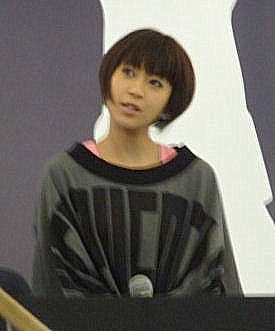Related Research Articles

Japanese singer Ayumi Hamasaki has released eighteen studio albums, five compilation albums, twenty-six remix albums, four live albums and numerous singles and promotional singles. She debuted in 1995 under Nippon Columbia with the stage name Ayumi, releasing an extended play Nothing from Nothing, which was a collaboration with Dohzi-T and DJ Bass. Three years later, Hamasaki debuted again as a singer under Avex Trax with the single "Poker Face" (1998). Her first album A Song for ×× (1999) debuted at number one on Oricon's albums chart, and sold over 1.4 million copies.

The discography of Japanese-American R&B and pop singer Hikaru Utada consists of eleven studio albums, three compilation albums, eleven video albums and numerous singles and promotional singles. Utada began as a musician in the early 1990s as a member of U3, a family unit made up of her, her mother Junko Utada, also known as 1970s enka singer Keiko Fuji, and her father, musical producer Teruzane Utada. U3 released their debut album Star in 1993, with the hope to debut in America. In 1996, the group was rebranded as Cubic U, an R&B project focusing on Hikaru Utada, resulting in the English language album Precious in 1998 with record label Toshiba EMI.
The discography of Japanese pop singer Koda Kumi includes 17 studio albums, 2 cover albums, 10 compilation albums, 10 remix albums, 9 live albums and 57 singles. All of her Japanese musical releases have been with Rhythm Zone, a sub-label of Avex Group.

The discography of Namie Amuro contains 12 studio albums, 7 compilation albums, 47 singles, 10 live albums, 14 video albums and 102 music videos. Amuro has also collaborated with Verbal of M-Flo and Ryōsuke Imai for her Suite Chic project.
The discography of the Japanese girl group Morning Musume consists of sixteen studio albums, five compilation albums, and seventy singles. Ever since its establishment in 1997, the group has experienced frequent line-up changes, and currently consists of twelve members: Mizuki Fukumura (leader), Erina Ikuta (sub-leader), Ayumi Ishida (sub-leader), Sakura Oda, Miki Nonaka, Maria Makino, Akane Haga, Reina Yokoyama, Rio Kitagawa, Homare Okamura, Mei Yamazaki and Rio Sakurai. The group was formed by Sharam Q vocalist Tsunku, who serves as their lyricist, composer, and producer.

The discography of Japanese R&B singer Misia consists of nine studio albums, three compilation albums, one extended play (EP), one live album, six remix albums, twenty-six singles, twelve promotional singles, eighteen video albums and thirty-seven music videos. In 1997, Misia signed a recording contract with BMG Japan and joined the then up-and-coming talent agency, Rhythmedia. Under the sub-label Arista Japan, Misia released her first single, "Tsutsumikomu Yō ni..." in February 1998, followed by "Hi no Ataru Basho" in May. In June, her debut album, Mother Father Brother Sister, opened at number three on the Oricon chart. The album peaked at number one three weeks later and stayed in the top five for eleven consecutive weeks. Mother Father Brother Sister was certified double million and won a Japan Record Award for Best Album, as well as a Japan Gold Disc Award for Pop Album of the Year. In 2000, Misia's second studio album, Love Is the Message, debuted at number one and was certified double million. It won a Japan Record Award for Best Album and a Japan Gold Disc Award for Pop Album of the Year. The album spawned three top ten hits: "Believe," "Wasurenai Hibi" and "Sweetness." Misia's first remix album, Misia Remix 2000 Little Tokyo, was released three months later and shot to number one. It sold over 800,000 copies and is the second best-selling remix album of all time in Japan.
The discography of Mika Nakashima includes 11 studio albums, 7 compilation albums, 45 singles and 20 video albums. These have all been released through Sony Music Entertainment Japan.
The solo discography of Japanese musician Yui consists of five studio albums, three compilation albums, twenty-one singles and five video albums. These were released on independent label Leaflet Records in 2004, followed by Sony Music Entertainment Japan sub-label Gr8! Records in 2005, Sony Records between 2005 and 2006, Sony sub-label Studioseven Recordings between 2007 and 2010, before returning to Gr8! Records in 2010.
The discography of Japanese contemporary R&B singer Crystal Kay consists of 12 studio albums, three extended plays, five compilation albums, four video albums and numerous single releases. Crystal Kay debuted as a singer at 13 years of age in 1999 under Epic Records Japan. Her third album Almost Seventeen (2002) saw a great leap in popularity for Crystal Kay, reaching number two on Oricon's albums chart. In 2005, Crystal Kay sang the eponymous theme song for the Tsuyoshi Kusanagi drama Koi ni Ochitara: Boku no Seikō no Himitsu. "Koi ni Ochitara" became Crystal Kay's most successful single, being certified for a million ringtone downloads.
The discography of Ayaka consists of six studio albums, two compilation albums, a cover album and numerous singles, released through Warner between 2006 and 2009, and through Ayaka's independent label, A Station, from 2012 onwards.

The discography of Japanese pop and electronic dance group Perfume consists of seven studio albums, three compilation albums, twenty-eight singles and six video albums. Forming in 2001, the group debuted as local Hiroshima idols, releasing two singles through the independent Momiji Label. In 2003, the members moved to Tokyo to further their career as idols. Signing with independent label Bee-Hive Records, the group met electronic producer Yasutaka Nakata of the band Capsule, who began to produce their music from 2003 onward.
The discography of Japanese R&B and pop singer Ken Hirai consists of ten studio albums, two compilation albums, one remix album, three cover albums, thirteen video albums and numerous singles and promotional singles. Hirai debuted as a musician under Sony Music Records in 1995 with the single "Precious Junk", but found success five years later with the single "Lakuen" and his third album, The Changing Same.
The discography of Japanese group KinKi Kids consists of 17 studio albums, 6 compilation albums, 25 video albums and 44 singles. All of KinKi Kids' singles have reached number one in Japan on Oricon charts. All of their music has been released by Johnny's Entertainment in Japan. In Taiwan, Kinki Kids' music has been released under Forward Music from 1997 to 2000, Skyhigh Entertainment and What's Music in 2001, and Avex Taiwan from 2002 to the present.
The Japanese boy band Kanjani Eight is a pop idol group managed by Johnny & Associates and works released by Infinity Records. The group, currently, has a total of 36 released singles, 9 studio albums, one mini album, and fifteen DVD releases. Thirty three of thirty six singles have placed at number-one on the Oricon singles chart. 47, the concert DVD for their 2007 nationwide tour, was the top selling music DVD of 2008.

The discography of Japanese musician Kaela Kimura consists of eleven studio albums, two compilation albums, one cover album, three extended plays, twenty-eight singles and five video albums. She debuted as a musician in 2004 under the label Columbia Music Entertainment, releasing ten albums with the company. In 2013, Kimura released Rock, an album of English language covers under her private label Ela Music. In 2014, Kimura released "Ole! Oh!", her first single under Victor Entertainment.

The discography of Japanese recording artist and actor Masaharu Fukuyama consists of ten studio albums, four compilation albums, three remix albums, twenty video albums, and numerous physical and promotional singles. Fukuyama debuted through BMG Japan by releasing the single "Tsuioku no Ame no Naka" (1990) and the album Dengon. The works failed to chart, however, in 1992 the single "Good Night", aided by the popularity it gained through use in the drama Ai wa Dō da, charted on the Oricon Singles Chart, peaking at number nine. In 1993, his album Calling became his first number one album on the Oricon Albums Chart; it has sold over 850,000 copies in Japan and has been certified two-times platinum by the Recording Industry Association of Japan (RIAJ).
The discography of Japanese musical act Rip Slyme consists of ten studio albums, four compilation albums, two extended plays, one live album, eight video albums and thirty-three singles. Rip Slyme debuted as an independent act on File Records in 1995, releasing material with them until their major label debut under Warner Music Japan in 2000. The band's second album under Warner, Tokyo Classic (2002) was a commercial success, selling over 1,000,000 copies.
The discography of M-Flo features nine studio albums, nine compilation albums, one live album and 25 singles. These were released on Labsoul Records and Avex Group independent label Rhythm Republic in 1998, and from 1999 onwards released through Rhythm Zone.
The discography of Japanese boy band SMAP consists of 21 studio albums, 5 compilation albums, 23 video albums, and numerous singles. Sports Music Assemble People, abbreviated as SMAP, was formed in 1988 by a group of backup dancers for the boy band Hikaru Genji of Johnny & Associates. The band's initial releases performed poorly on the charts, but the following ones started gaining attention, aided by the group's appearance on their own variety show, SMAP×SMAP. Meanwhile Kimi Iro Omoi single was used in anime Akazukin Chacha broadcast in Japan only. In worldwide broadcast, Kimi Iro Omoi single was replaced by Shoko Sawada. However, that single can only available on MP3 Store, then download between TV Size and Full version. Their 2003 single "Sekai ni Hitotsu Dake no Hana" sold over two million copies in Japan, becoming one of the best-selling singles in the country. In August 2016, the group announced that they will disband by the year end. Since 2003, all of the band's releases have peaked at number one on the Oricon Albums or Singles Chart. The group has sold over 38,5 million records in Japan.

The discography of the Japanese pop group Sandaime J Soul Brothers consists of eight studio albums, two compilation albums, and twenty-six singles. Since the group's original formation in 1999, the group has experienced two line-up changes and reboots, and currently consists of seven members: Naoto Kataoka, Naoki Kobayashi, Ryuji Imaichi, Hiroomi Tosaka, Elly, Takanori Iwata, Kenjiro Yamashita. The group was formed by producer and former Exile member Hiroyuki Igarashi who founded the group's management agency LDH Japan.
References
- 1 2 3 4 5 "赤西仁の作品" [Jin Akanishi Projects]. Oricon . Retrieved November 5, 2014.
- 1 2 3 "G-Music Combo Chart" (in Chinese). G-Music. Archived from the original on February 11, 2013. Retrieved November 5, 2014.
- 1 2 3 "G-Music J-Pop Chart" (in Chinese). G-Music. Archived from the original on May 12, 2011. Retrieved November 5, 2014.
- ↑ "Jin Akanishi - Chart history Billboard (Billboard 200)". Billboard. Retrieved November 5, 2014.
- 1 2 3 4 5 6 7 8 9 10 11 12 13 14 "オリコンランキング情報サービス「you大樹」" [Oricon Ranking Information Service 'You Big Tree']. Oricon . Retrieved November 1, 2014.
- ↑ ゴールド等認定作品一覧 2010年1月 [Works Receiving Certifications List (Gold, etc) (January 2010)] (in Japanese). Recording Industry Association of Japan. February 10, 2010. Retrieved February 13, 2014.
- ↑ "Japonicana". Amazon. Retrieved November 6, 2014.
- ↑ ゴールド等認定作品一覧 2012年3月 [Works Receiving Certifications List (Gold, etc) (March 2012)] (in Japanese). Recording Industry Association of Japan. April 10, 2012. Retrieved February 8, 2014.
- ↑ "Blessèd". Amazon. Retrieved December 12, 2017.
- ↑ 週間 CDアルバムランキング 2019年05月27日付 [Weekly CD Album Ranking on May 27, 2019]. Oricon News (in Japanese). Retrieved May 22, 2019.
- ↑ "Jin Akanishi to Release Re-Arranged Album 'À la carte' on August 1". Moshi Moshi Nippon. 7 June 2018. Archived from the original on 12 January 2024. Retrieved 12 January 2024.
- ↑ "【メーカー特典あり】À la carte(通常盤)【特典:ビッグサイズ・ポストカード (À la carte ver.)付】". Amazon (in Japanese). Archived from the original on 12 January 2024. Retrieved 12 January 2024.
- ↑ "A la carte(初回限定盤)(DVD付)". Amazon (in Japanese). Archived from the original on 12 January 2024. Retrieved 12 January 2024.
- ↑ "À la carte 赤西 仁". Amazon (in Japanese). Archived from the original on 12 January 2024. Retrieved 12 January 2024.
- ↑ "À la carte 赤西 仁". Apple Music (in Japanese). Archived from the original on 12 January 2024. Retrieved 12 January 2024.
- ↑ "À la carte [UNIVERSAL MUSIC STORE限定盤 プレミアム・ボックスセット(DVD)][完全受注生産]". Universal Music Japan. Archived from the original on 12 January 2024. Retrieved 12 January 2024.
- ↑ "À la carte [UNIVERSAL MUSIC STORE限定盤 プレミアム・ボックスセット(Blu-ray)][完全受注生産]". Universal Music Japan (in Japanese). Archived from the original on 12 January 2024. Retrieved 12 January 2024.
- ↑ "Jin's first album [Our Best] Release date set for April 22!". Jin Akanishi Official site. 22 February 2020. Archived from the original on 12 January 2024. Retrieved 12 January 2024.
- ↑ "赤西仁、初のベストアルバムが通算2作目の1位「10年って長いようで短いな」【オリコンランキング】". Oricon (in Japanese). 28 April 2020. Archived from the original on 12 January 2024. Retrieved 12 January 2024.
- ↑ "Our best ~ My best Jin Akanishi". Apple Music. Archived from the original on 12 January 2024. Retrieved 12 January 2024.
- ↑ "Our best ~ Your best Jin Akanishi". Apple Music. Archived from the original on 12 January 2024. Retrieved 12 January 2024.
- ↑ "Jin Akanishi Official Store". Jin Akanishi Official site. Archived from the original on 12 January 2024. Retrieved 12 January 2024.
- ↑ ゴールド等認定作品一覧 2011年12月 [Works Receiving Certifications List (Gold, etc) (December 2011)] (in Japanese). Recording Industry Association of Japan. January 10, 2012. Retrieved February 8, 2014.
- 1 2 "Hot 100|JAPAN Charts|Billboard JAPAN" (in Japanese). Billboard.
- ↑ "Japan Billboard Hot 100". Billboard (in Japanese). December 2, 2009. Retrieved November 5, 2014.
- ↑ "Japan Billboard Hot 100". Billboard (in Japanese). January 20, 2010. Retrieved November 5, 2014.
- ↑ "Japan Billboard Hot 100". Billboard (in Japanese). March 9, 2011. Retrieved November 5, 2014.
- ↑ "Japan Billboard Hot 100". Billboard (in Japanese). December 14, 2011. Retrieved November 5, 2014.
- ↑ "Japan Billboard Hot 100". Billboard (in Japanese). January 11, 2012. Retrieved November 5, 2014.
- ↑ "Japan Billboard Hot 100". Billboard (in Japanese). March 14, 2012. Retrieved November 5, 2014.
- ↑ "Japan Billboard Hot 100". Billboard (in Japanese). August 14, 2013. Retrieved November 5, 2014.
- ↑ "Japan Billboard Hot 100". Billboard (in Japanese). October 9, 2013. Retrieved November 5, 2014.
- ↑ "Japan Billboard Hot 100". Billboard (in Japanese). August 13, 2014. Retrieved November 5, 2014.
- ↑ "Jin Akanishi - Chart history Billboard (Dance Club Songs)". Billboard. Retrieved November 5, 2014.
- ↑ ゴールド等認定作品一覧 2009年11月 [Works Receiving Certifications List (Gold, etc) (November 2009)] (in Japanese). Recording Industry Association of Japan. December 10, 2009. Retrieved February 9, 2014.
- ↑ ゴールド等認定作品一覧 2011年3月 [Works Receiving Certifications List (Gold, etc) (March 2011)] (in Japanese). Recording Industry Association of Japan. April 10, 2011. Retrieved December 31, 2013.
- ↑ ゴールド等認定作品一覧 2012年1月 [Works Receiving Certifications List (Gold, etc) (January 2012)] (in Japanese). Recording Industry Association of Japan. February 10, 2012. Retrieved December 31, 2013.
- ↑ ゴールド等認定作品一覧 2013年8月 [Works Receiving Certifications List (Gold, etc) (August 2013)] (in Japanese). Recording Industry Association of Japan. September 10, 2013. Retrieved February 8, 2014.
- ↑ "Akanishi Jin & Yamada Takayuki to form a unit and release debut single". Tokyohive. 10 August 2016. Archived from the original on 21 March 2019. Retrieved 11 January 2024.
- ↑ 赤西仁、自分自身を表現した新作発売&全国ツアーも開催 (in Japanese). Natalie. May 8, 2015. Retrieved May 9, 2015.
- ↑ "レコード協会調べ 2011年12月14日~2011年12月20日 <略称:レコ協チャート(「着うたフル(R)」)>" [Record Association report: 2011.12.14~2011.12.20 <abb. Reco-kyō Chart 'Chaku-uta Full'>] (in Japanese). Recording Industry Association of Japan. December 23, 2011. Archived from the original on October 13, 2014. Retrieved October 13, 2014.
- ↑ "レコード協会調べ 2011年12月14日~2011年12月20日 <略称:レコ協チャート(「着うたフル(R)」)>" [Record Association report: 2011.12.14~2011.12.20 <abb. Reco-kyō Chart 'Chaku-uta Full'>] (in Japanese). Recording Industry Association of Japan. December 23, 2011. Archived from the original on November 6, 2014. Retrieved November 6, 2014.
- ↑ "G-Music Audio/Video Chart" (in Chinese). G-Music. Archived from the original on August 9, 2010. Retrieved November 5, 2014.
- ↑ ゴールド等認定作品一覧 2011年5月 [Works Receiving Certifications List (Gold, etc) (May 2011)] (in Japanese). Recording Industry Association of Japan. June 10, 2011. Retrieved March 18, 2014.